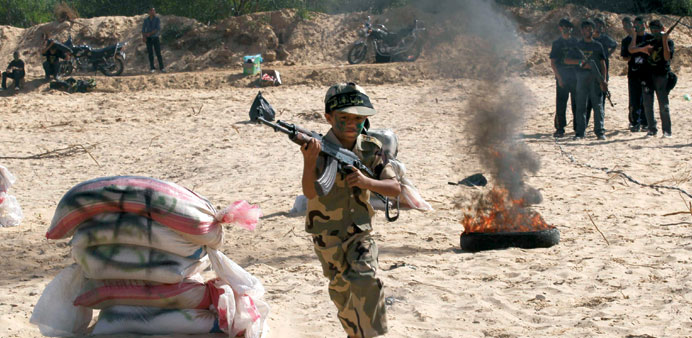A Palestinian boy takes part in a military-style summer camp being held by the Islamic Jihad movement, in Rafah town in the southern Gaza Strip yesterday. Thousands of youngsters receive military as well as religious training at the summer camp.
AFP/Bethlehem
Leaders of a growing Palestinian movement to boycott Israel oppose any peace talks, even if they include a long-demanded freeze of Jewish settlements on Palestinian land.
“We have no faith... in the so-called negotiations,” said Omar Barghuti, head of the Boycott, Divestment and Sanctions (BDS) movement, which lobbies worldwide for the economic, cultural and academic boycott of Israel.
Speaking to AFP on the sidelines of the fourth annual BDS conference at Bethlehem University at the weekend, Barghuti said the talks were “absolutely useless, just another smokescreen to allow Israel to continue its colonisation—its building of settlements”.
The Palestinians have demanded not only a freeze on settlement building but also a return to lines that existed before Israel seized the West Bank, East Jerusalem and Gaza in the 1967 Six-Day War.
But Barghuti said that, even if these key demands were met, negotiations would still be unacceptable.
The only way to ensure the Palestinians secured all their rights is through the non-violent “resistance” of a full boycott of Israel.
Barghuti said that for there to be peace, the Israelis must guarantee the right of return for Palestinian refugees everywhere and equal rights for Arab Israelis, as well as a complete end to the occupation of Palestinian territories.
At the conference, local BDS leaders called in impassioned speeches on the Palestinian leadership not to “play the role of mediator between us and Israel”, demanding instead that they focus their energies on sanctioning the Jewish state.
The movement says it is inspired by the non-violent South African civil rights movement and deplores what it calls Israel’s own “apartheid” against Palestinians.
One of its more celebrated backers is South African anti-apartheid icon Desmond Tutu, who addressed delegates by video conference.
“This is a universe where right will ultimately prevail, and you are on the side of right,” he said, to thunderous applause.
Pink Floyd bassist Roger Waters also sent a message, urging fellow musicians to refuse to perform in Israel as part of the cultural boycott.
Israel “uses performances by foreign artists to create a facade of normalcy and acceptability”, he told them in a pre-recorded message.
Waters also praised a recent decision by renowned British physicist Stephen Hawking to pull out of a Jerusalem conference to be hosted next week by Israeli President Shimon Peres as part of the academic boycott—a move listed by BDS as one of its notable achievements of the year.
Other “successes” include Adidas dropping its sponsorship of the Jerusalem marathon in March after pressure from the movement, and the UN publishing reports calling for sanctions against Israeli settlements.
The group’s influence is definitely being felt.
Stevie Wonder pulled out of an Israeli army fundraiser in November after pressure from Tutu and Waters, and fellow US singer Lenny Kravitz cancelled a Tel Aviv concert in October after being petitioned by activists, citing a scheduling conflict.
But a recent campaign to boycott a Formula 1 peace road show with the participation of the Scuderia Ferrari and Marussia F1 teams and several internationally acclaimed motorcyclists has fallen flat, with the event set to take place in Jerusalem today.
In a separate but related development, the European Union has also called for clear and unambiguous labelling of products being exported from Jewish settlements in the West Bank, reiterating that settlement building is illegal under international law.
But the move, which was to have been approved by EU foreign ministers in May, has been delayed until the end of this month, reportedly at the request of Washington in a move denounced by Palestinian legislator Mustafa Barghuti as “disappointing”.
“This hesitation on the part of the EU is disappointing. The quicker they move the better it will be,” he said.
“The US is pressuring the wrong side,” he continued.
“They should have pressured Israel. As long as the US is afraid of pressuring Israel, nothing will move.”

